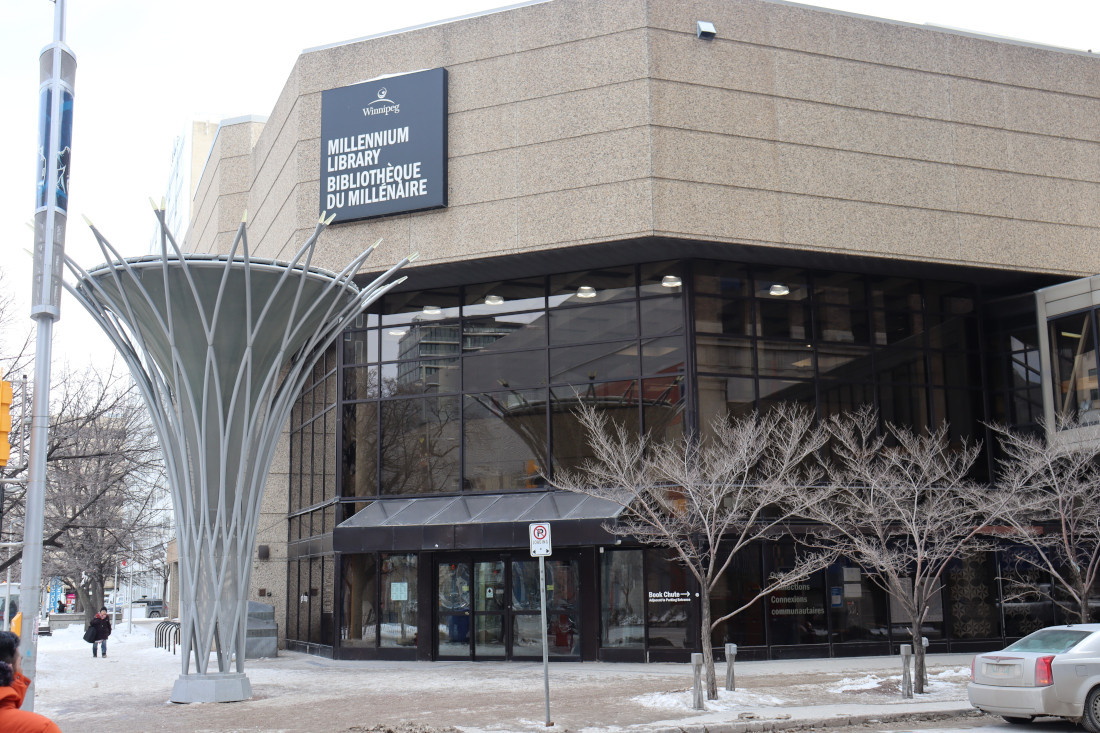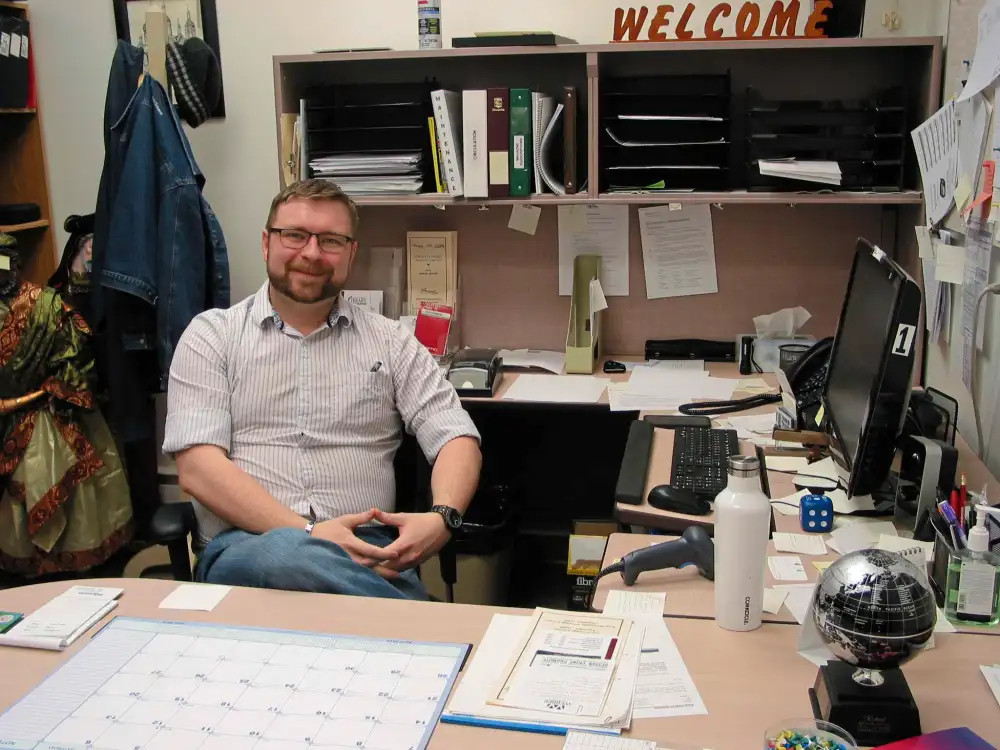City support for libraries is overdue
Winnipeg is falling behind in funding and staffing its libraries
Libraries are intersections of cultures, knowledge and accessibility within cities. Libraries are much more than places for books. They’re sacred spaces and part of community ecosystems.
On a Friday afternoon, Winnipeg’s Millennium Library is no different. There’s a child reclining in a mint-coloured chair, flipping through a picture book taller than him. A man in a bright, neon-yellow construction vest is charging his phone at a kiosk while sipping from a Tim Hortons coffee cup.
A woman and her father speak with a librarian about how to print a tax form off the computer. An elderly man walks over to a shelf, picks up a Marvel Daredevil comic book and relaxes on a bench.
This atmosphere is pierced by the beeping of the metal detector at the entrance and radios attached to the vests of two police officers leaning against a table. The now-closed Community Connections space, which opened in April 2022, sits empty across from the line of people waiting to get inspected and scanned to enter the library space.
Using the library
Nicole Brown has been a dedicated library user for 10 years. She’s visited all 20 library branches in Winnipeg, hunting for new graphic novels to check out. Brown enjoys going to the smaller branches because of the more intimate, community feeling they offer but does occasionally go to the Millennium branch for more resources.
“I go to the Harvey Smith branch the most,” she says. “It’s quiet, and the staff are really friendly. There’s a lot of teenagers hanging out outside and inside the library. There’s lots of families coming with children and checking out lots of books, which is good to see.”
Brown says libraries provide resources for children in her community who might not otherwise have regular access to books. The lessened amount of programming has impacted the atmosphere of the library, but the staff are still passionate about helping people who come in.
“It’s the one last place you can visit where you’re not expected to pay,” she says. “All of the services are free, and there’s no barriers for finances. It’s a good space.”
For the most part, libraries are free of charge, except for certain printing services and memberships for non-Winnipeg residents.
However, the accessible spaces and resources that the Winnipeg Public Library (WPL) provides are at risk. The City’s preliminary operating budget for 2023 includes funding cuts for services and circulation, as well as increased salaries for library staff. The Millennium branch requires patrons to go through airport-style security measures on every visit. Library staff and community advocates are sounding the alarm and pleading for financial support.
The Instagram account @wpglibraryfacts first posted on Feb. 13, less than a week after the 2023 preliminary budget was announced. Since then, has posted more than 60 times. It’s run by a collection of past and present library staff members who created a space for concerned workers to speak anonymously.
One post says, “I asked for a sharps container (for safe disposal of used needles) for my library’s public washroom but was told that there was no funding.” While the cost of some elaborate sharps containers can exceed $100, many basic varieties cost less than $10.
Another post reads, “We didn’t have any money to run an important community program and had to bring in and reuse our own materials from home.”
@wpglibraryfacts declined to be interviewed for this article.
Underfunded and understaffed
Winnipeg’s libraries are underfunded and understaffed when compared to those in other Canadian cities.
According to an analysis provided by the Manitoba Libraries Association, the WPL’s 2021 operating budget was spending $36.22 per 100,000 people. This is smaller than the budgets of Regina, Saskatoon, Calgary, Edmonton, Hamilton, Ottawa, Halifax and Victoria. Calgary is the next closest, spending $41.05 per 100,000 people.
Currently, the WPL has 267 full-time employees or equivalent positions. The proposed 2023 budget would cut 11 full-time staffers. The WPL has less library staff when compared to even smaller cities like Hamilton and Halifax.
Provincial funding for the WPL has been stagnant for 35 years, and the Province has only contributed slightly more than $2 million annually since 1987. Provincial funding accounts for a little more than 6 per cent of the total WPL budget.
Dr. Aaron Moore chairs the political-sciences department at the University of Winnipeg. He says because of Winnipeg’s long history of tax freezes, funding has been cut for many services, including libraries.
“If you really want to compare Winnipeg to other jurisdictions, you have to understand that where most other jurisdictions saw their taxes going up, Winnipeg was keeping them flat,” he says. “The consequence of that is you have less and less resources.”
Moore says politics and department demands are interwoven with the budgeting process. Despite having a budget of more than $1 billion, Winnipeg’s operating budget is largely tied up by fixed costs.
“The actual pie of money that’s discretionary isn’t a huge amount,” Moore says. “It will come down to politics and trying to balance the interests and demands of multiple different departments within the city. Sometimes, they’re going to prioritize certain costs over others.”
For example, the police budget will increase almost 50 times more than the WPL’s and includes the addition of 11 fulltime employees.
The WPL is the outlier in Canadian library governance. It’s rare for a municipal government to directly control a Canadian library system. The City’s community-services department operates the WPL. While the WPL has a board, it only serves in an advisory capacity.
Richard Bee, director of advocacy for the Manitoba Libraries Association, says library boards are typically treated the same as police boards. They set budgets, staffing levels, policies and mission statements for the library with full autonomy.
He says it’s important for a library board to remain at arms’ length from its municipal government, because it allows the library to fully function as a free and accessible public resource without being caught up in politics.
“WPL having an advisory board allows it to be undercut by city administration,” Bee says. “Now you have this added layer of politics and bureaucracy that WPL is having to navigate that no other library system has to deal with.”
Coun. John Orlikow, the community-services chair, didn’t respond for comment by press time.
The fight for accessibility
Dr. Joe Curnow is part of the library advocacy group Millennium for All. Started in 2019 after security screening was first introduced at the Millennium Library, the organization speaks out against the renewed security measures.
She says Millennium for All pushes for the City to use evidence-based strategies that cost less and support library staff and community members instead of the current measures that can push people away.
According to a Millennium for All study published in 2019, airport-style security screening causes a 25 to 32 per cent reduction in people entering the library. The security measures have also forced many programs to either move elsewhere or shut down. The Community Connections space that opened in April 2022 has been closed since police and security screening returned to the library.
“A lot of organizations and nonprofits don’t feel they can say to their users that it’s a safe space. They’re likely to get harassed at the door or turned away based on race, class and gender. As a result, these organizations don’t feel they can use the library for their programming right now,” Curnow says.
The city has dedicated $100,000 for 2023 for ongoing security measures at the Millennium Library. In January, Winnipeg’s chief administrative officer, Michael Jack, told CBC these measures cost the City “in excess of $10,000 a week.” No other city in Canada has this level of library security.
“For every hour we have these two special-duty cops, we could pay for a full-time librarian who’s dedicated to the Community Connections space, a dedicated library assistant, one or two crisis workers, plus consumables,” Curnow says.
She also says increasing the number of staff can effectively help library employees and visitors feel safer.
“City council keeps cutting away until there’s literally no time for staff to have a 15-minute overlap in shifts or have safety briefings or to have enough people on the floor to respond to needs quickly,” she says.
Curnow says the City can best support the WPL and the Millennium Library by reopening the Community Connections space, funding the Community Safety Host program (a peer-based security service), increasing staffing and bringing the security team in-house.
Having a voice
Kirsten Wurmann is a retired librarian who worked for 11 years as a WPL branch manager. She says that despite doing exciting work and having it align with her social-justice values, she began to feel misunderstood and unsupported as a librarian.
To be a librarian, individuals must complete a master’s degree in library science. Manitoba currently offers no such program.
“I certainly took a cut when I came here to Winnipeg from Edmonton. I took the $20,000 a year cut,” she says. “In my retirement letter, I actually said that it became offensive considering the workload.”
Wurmann says now that she is retired, she is able to speak freely about the issues she experienced while working at the WPL.
“Working for a public library, working for the City, you cannot share the realities that are actually happening,” she says. In the past, Wurmann says library employees have been reprimanded for retweets or sharing news articles about the library.
“I know some workers have felt that their social media is being watched or monitored. It sounds ridiculous, but this is the reality. Folks are nervous.”
During an executive policy committee meeting on March 16, Wurmann spoke as a delegate about the upcoming library budget and her experience as a librarian. As she began speaking, three of the six councillors present walked out.
“For the very first time, I spoke to my former bosses and shared my reality and my story and three out of the six left. It just felt so rude, and I felt hurt. I was starting to feel actually even a little emotional,” Wurmann says.
Couns. Brian Mayes and Jeff Browaty say they had to leave to use the bathroom and take a call, and their actions weren’t related to who was speaking. Coun. Sherri Rollins says she left to check on people who were affected by a homophobic incident.
Wurmann says she understands that it was a long day, but this incident raises the issue about a lack of opportunities for citizens to share their voice.
She describes how libraries have become more than places for books. Now, they serve as community spaces.
“It’s the neighbourhood living room,” Wurmann says. “It’s a space where you can bring in food and drink. You can talk to neighbours. You can have storytime. You can use computers, which is a lifesaving service that we provide. It’s such a growing social service.”
Brown says the City needs to listen to library staff and recognize the importance of supporting Winnipeg’s libraries. “The libraries are more than a place for books,” she says. “They’re a community pillar.”
Published in Volume 77, Number 23 of The Uniter (March 23, 2023)









